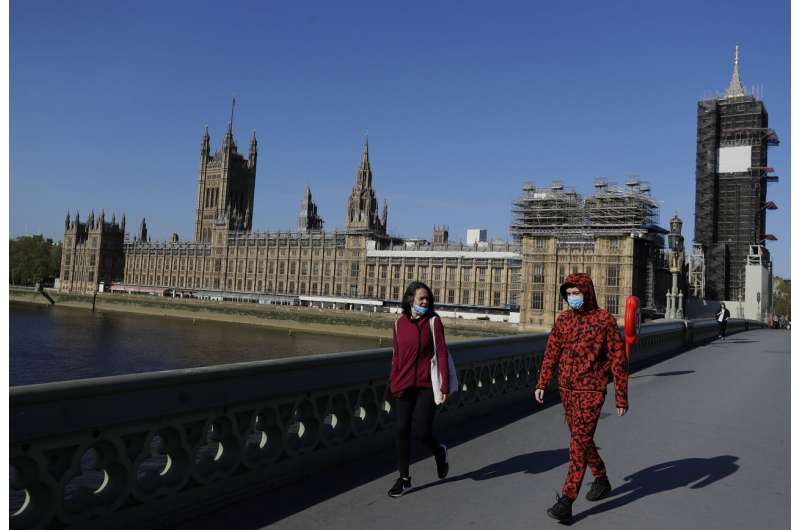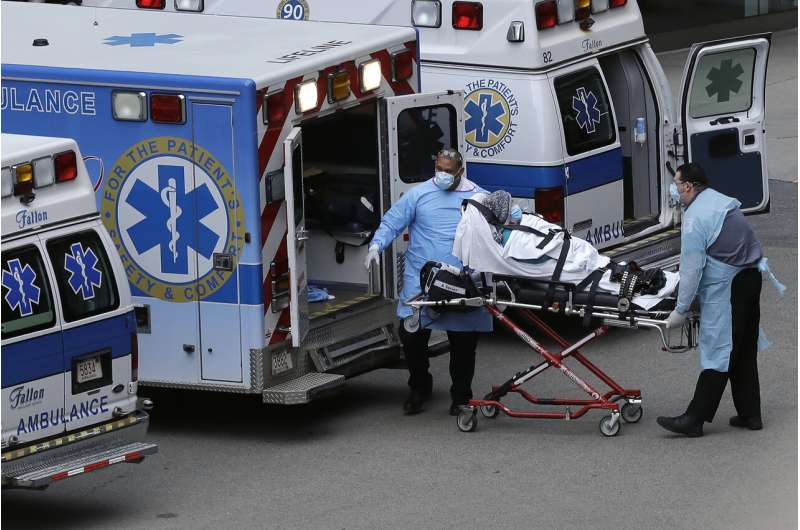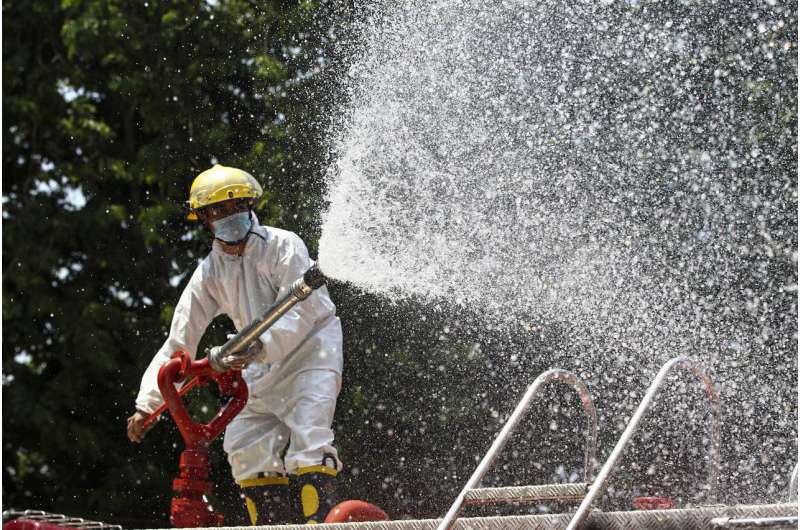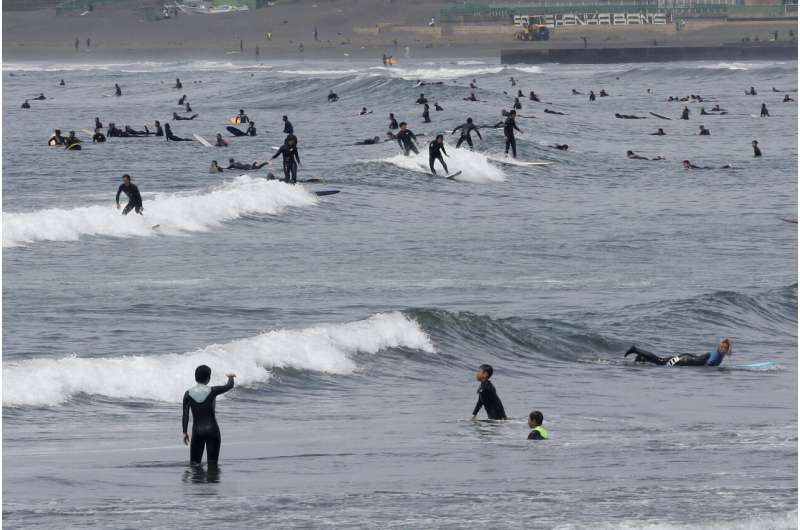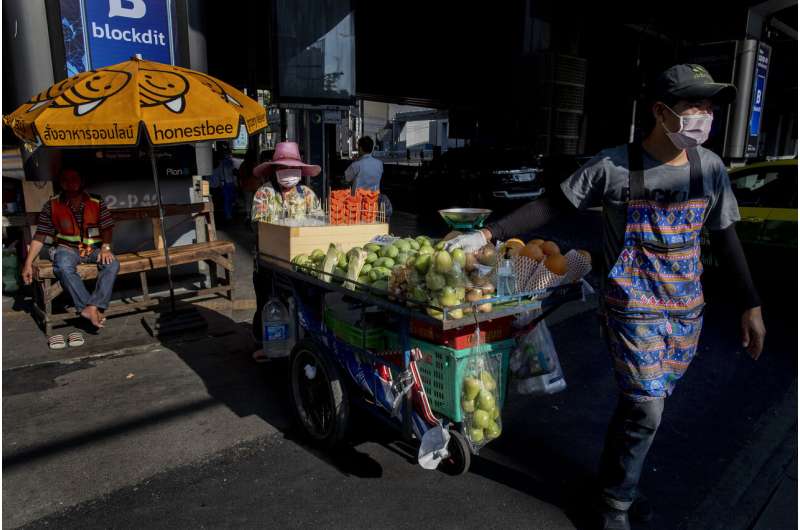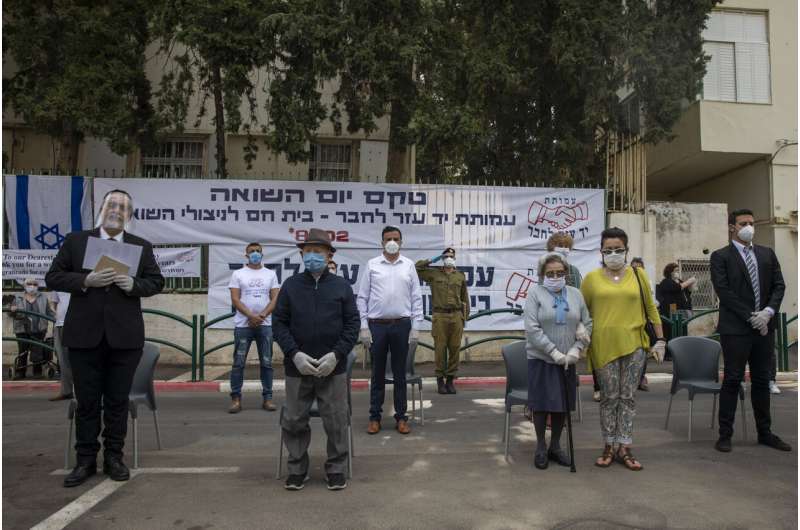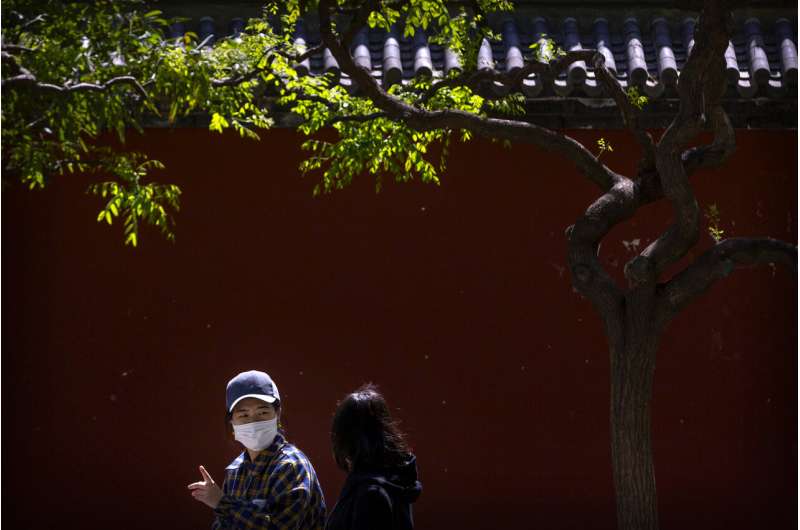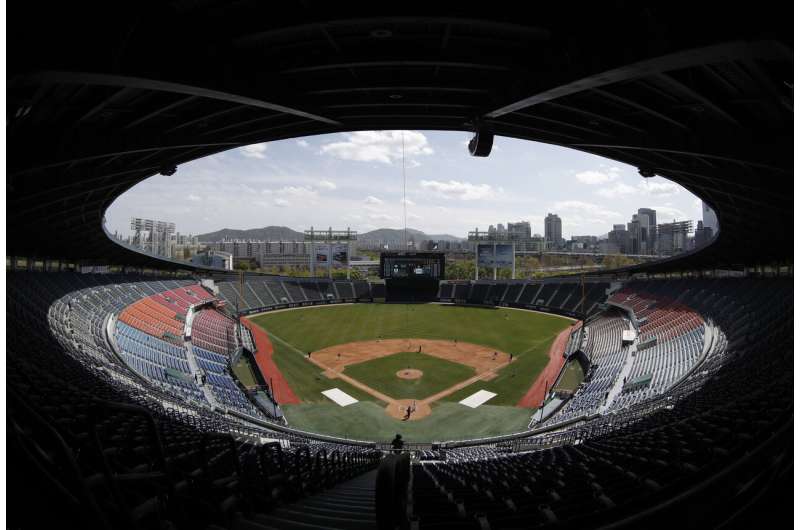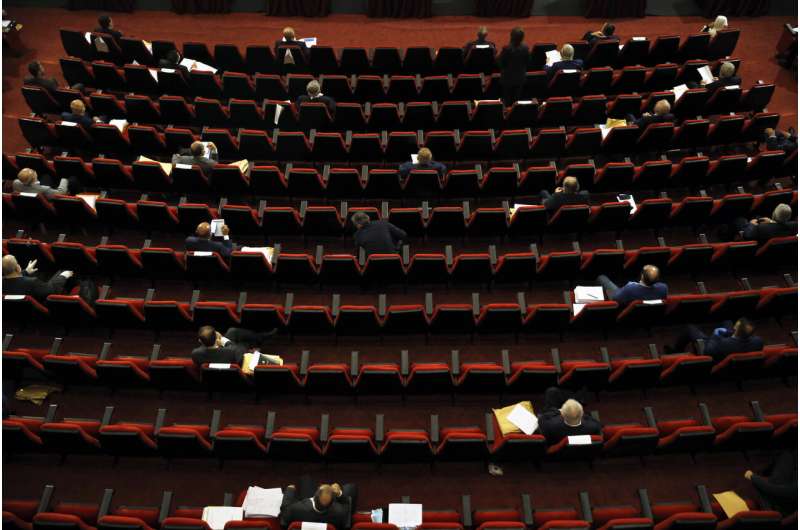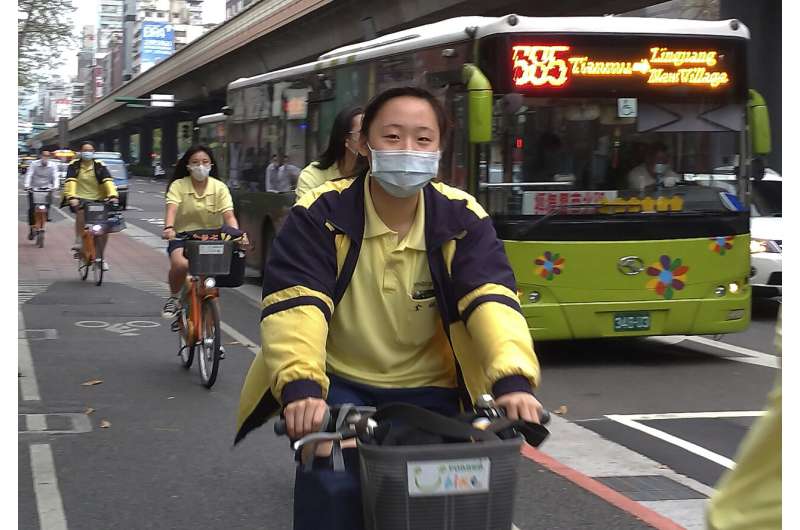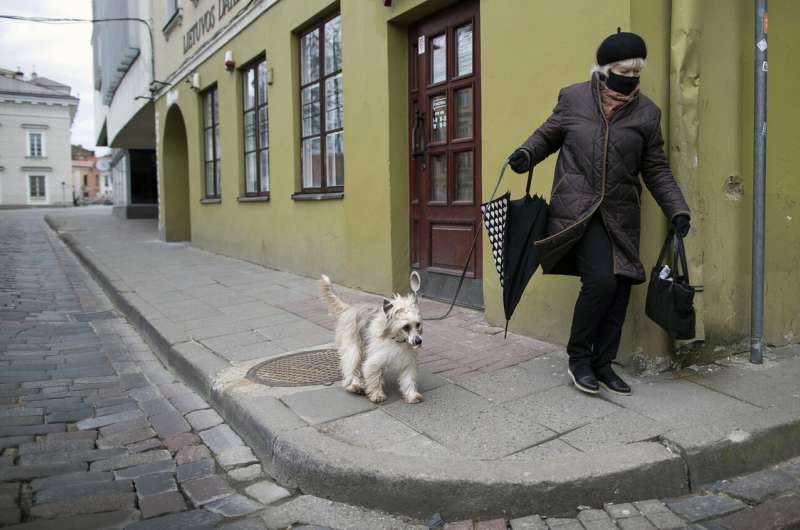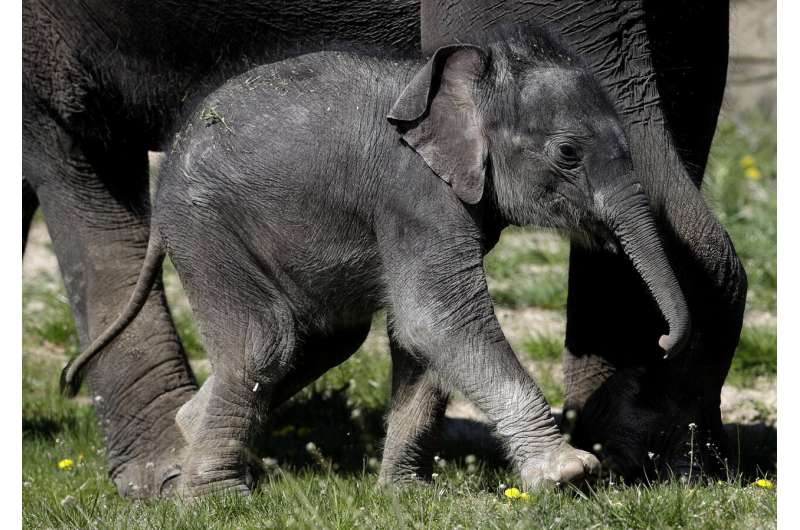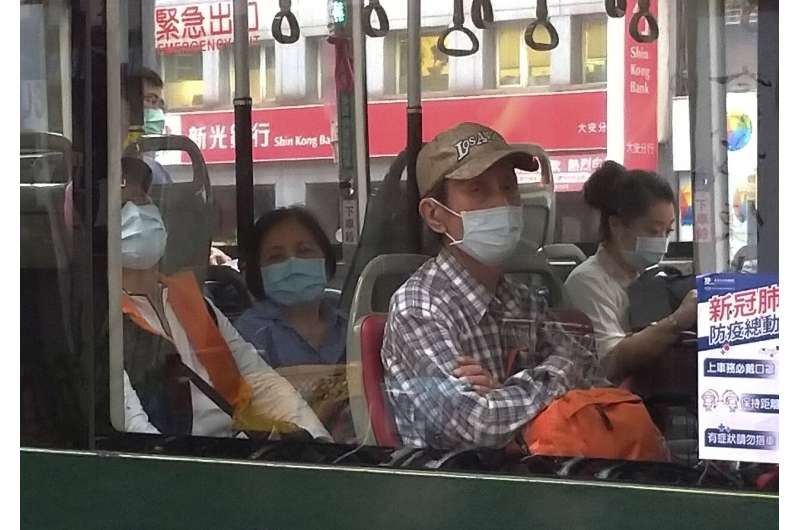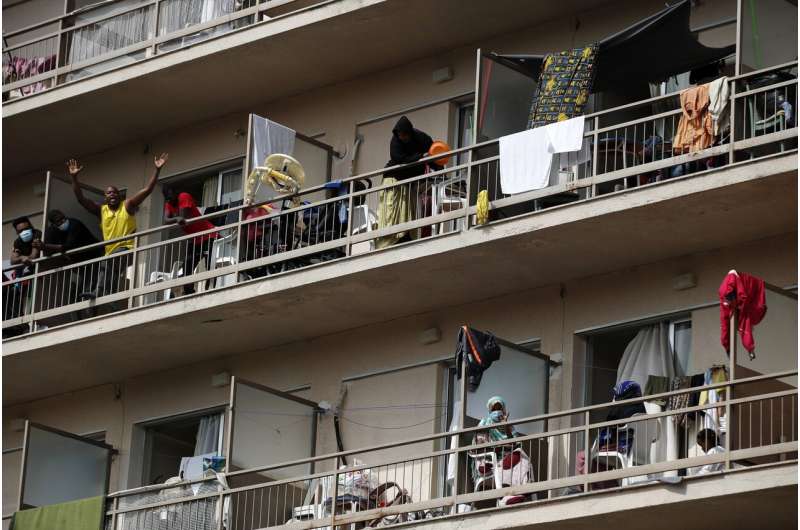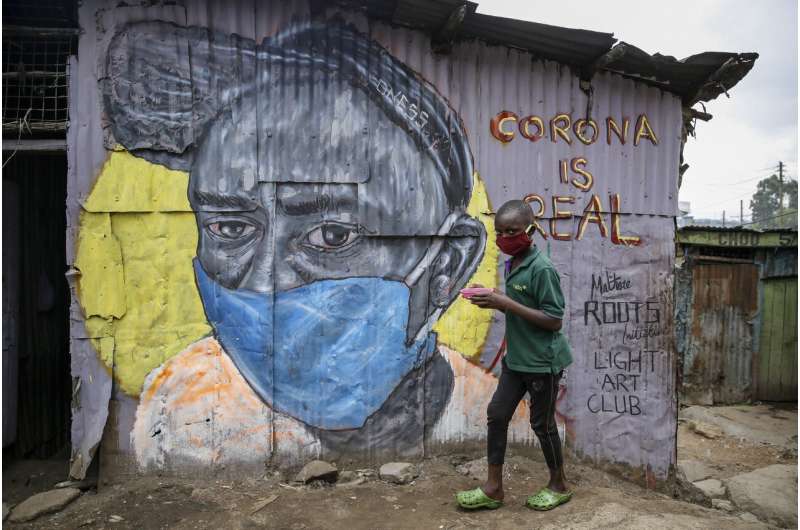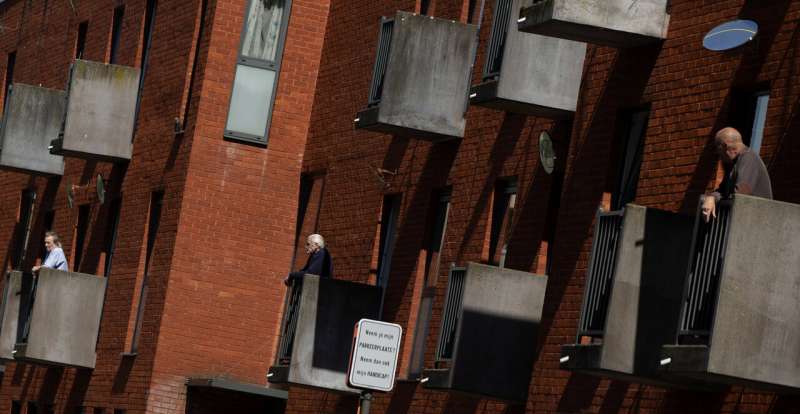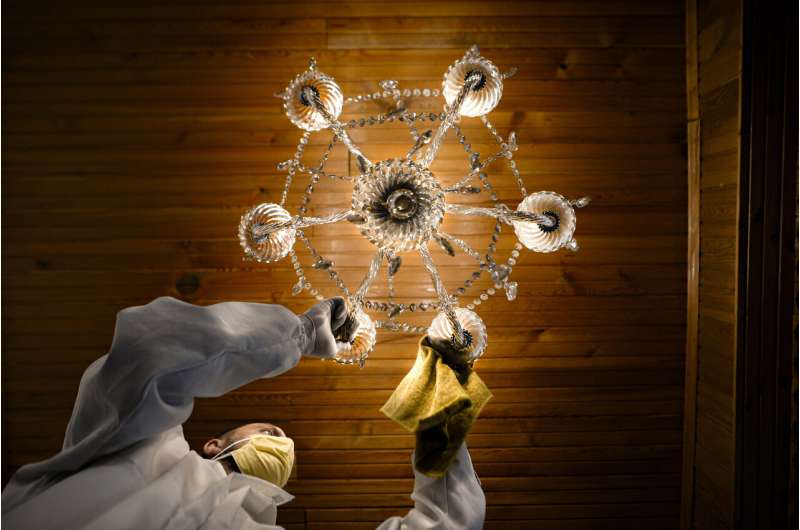People wear masks as they walk near Britain's Houses of Parliament as the country is in lockdown to help curb the spread of coronavirus, in London, Tuesday, April 21, 2020. Britain's Parliament is going back to work, and the political authorities have a message for lawmakers: Stay away. U.K. legislators and most parliamentary staff were sent home in late March as part of a nationwide lockdown to slow the spread of the new coronavirus. With more than 16,500 people dead and criticism growing of the government's response to the pandemic, legislators are returning Tuesday—at least virtually—to grapple with the crisis.(AP Photo/Kirsty Wigglesworth)
Spain will begin allowing children out of their homes for brief periods next Monday. Denmark announced plans to reopen Tivoli Gardens, the Copenhagen amusement park that inspired Walt Disney. And Australia said doctors can resume non-urgent surgery next week.
Countries across Europe and beyond—joined in the U.S. by a cascade of states—moved to gradually reopen amid warnings that acting too quickly could enable the virus to come back with a vengeance.
Meanwhile, U.N. leaders called for efforts to ensure that all people have access to testing, medical supplies, drugs and future vaccines, especially in developing countries.
African officials have been outspoken about the need for medical supplies across the 54-nation continent, where health care systems are weak and could become overwhelmed.
Even under a best-case scenario, Africa will need $44 billion for testing, personal protective equipment and treatment of coronavirus, according to a report last week by the U.N. Economic Commission for Africa. The worst-case scenario estimates $446 billion would be needed.
The World Health Organization said the number of beds in intensive care units available to treat COVID-19 patients in 43 African countries is less than 5,000. That is about five beds per 1 million people, compared with 4,000 beds per 1 million in Europe.
Medical personnel wearing personal protective equipment out of concern for the coronavirus remove a person from an ambulance near an entrance to Massachusetts General Hospital, in Boston, Monday, April 20, 2020. (AP Photo/Steven Senne)
Africa has more than 23,000 infections across the continent, including more than 1,100 deaths. Authorities are trying to expand testing rapidly, with the goal of testing 1 million people over the next four weeks.
Many countries have been grappling with the inequality the virus has often laid bare, and how to ensure everyone has access to protective equipment and other products.
In Spain, which is among the worst-hit countries, authorities are deciding on price caps for face masks, gloves, hand sanitizers and other protective equipment that has been in short supply. The government published an order Sunday saying prices cannot be "exploitative."
Worldwide, the virus has infected nearly 2.5 million people and caused more than 170,000 deaths, according to a Johns Hopkins University count. The U.S. has recorded more than 42,000 deaths—the highest in the world—and nearly 800,000 infections.
A member of the fire department wearing full protective gear sprays disinfectant from the fire engine in hopes of curbing the spread of the new coronavirus in a street Tuesday, April 21, 2020, in Yangon, Myanmar. (AP Photo/Thein Zaw)
The true toll around the world is believed much higher, in part because of limited testing, difficulties in counting the dead and efforts by some governments to hide the extent of their outbreaks.
Meanwhile, Denmark, Austria, Spain and Germany began allowing some people back to work, including hairdressers, dentists and construction workers.
Copenhagen's Tivoli Gardens said it will reopen on May 11.
In Austria, Chancellor Sebastian Kurz said all shops will reopen at the beginning of May and restaurants in mid-May. He said the government will review the situation at two-week intervals, and will "pull the emergency brake if that is necessary."
But in an indication that it will be a long time before life returns to normal, Spain canceled its running of the bulls in Pamplona in July, an event made world-famous by Ernest Hemingway's 1926 novel "The Sun Also Rises." The U.S. canceled the Scripps National Spelling Bee, set for early June. And Germany called off the world-famous Oktoberfest beer festival in Munich, which draws about 6 million visitors each year in the fall.
People go surfing off Katase Kaigan beach in Fujisawa, near Tokyo, Tuesday, April 21, 2020. Japan's Prime Minister Shinzo Abe expanded a state of emergency to all of Japan from just Tokyo and other urban areas as the virus continues to spread. (AP Photo/Koji Sasahara)
"We agreed that the risk is simply too high," Bavarian governor Markus Soeder said after meeting with Munich's mayor.
Germany, which has been praised for its widespread testing for the virus, allowed small shops to reopen this week. It remains unclear when bars and restaurants will start up again.
In Italy, Premier Giuseppe Conte confirmed that businesses can start reopening on May 4 but doused any hopes of a full end to the country's strict lockdown.
"Many citizens are tired of the efforts that have been made so far and would like a significant loosening of these measures, or even their total abolition,'' Conte said on Facebook. "A decision of that kind would be irresponsible.''
In the U.S., some states, including Georgia, South Carolina, Tennessee, West Virginia and Colorado, announced plans to gradually reopen in the coming days, despite the concerns of health officials. Boeing and at least one other American heavy equipment manufacturer resumed production.
-
Street venders push a fruit cart in Bangkok, Thailand, Tuesday, April 21, 2020. A month-long state of emergency remains enforced in Thailand to allow its government to impose stricter measures to control the coronavirus that has infected hundreds of people in the Southeast Asian country. (AP Photo/Gemunu Amarasinghe)
-
Holocaust survivor Shalom Stamberg, second left, and Holocaust survivor Miriam Linial, third right, wear a mask and keep a safe distance from others while the two-minute-long siren sounds during an annual Holocaust memorial ceremony held outside this year because of the coronavirus, in the northern Israeli city of Haifa, Israel, Tuesday, April 21, 2020. Stamberg, 97 and Linial, 99, both Holocaust survivors from Poland. The Hebrew sign reads "Holocaust memorial ceremony and Yad Ezer La-Haver foundation, warm home for Holocaust survivors". (AP Photo/Ariel Schalit)
-
People wearing face masks to protect against the spread of the new coronavirus walk in a public park in Beijing, Tuesday, April 21, 2020. China reported about a dozen coronavirus cases Tuesday, about half of them in the province of Heilongjiang that borders Russia. (AP Photo/Mark Schiefelbein)
-
Stadium seats are empty as a part of precaution against the new coronavirus during the pre-season baseball game between Doosan Bears and LG Twins in Seoul, South Korea, Tuesday, April 21, 2020. South Korea's professional baseball league has decided to begin its new season on May 5, initially without fans, following a postponement over the coronavirus. (AP Photo/Lee Jin-man)
-
Lebanon's parliament begins a three-day legislative session at a Beirut theater so that legislators can observe coronavirus social distancing measures, as protests against the country's ruling elite in the crisis-hit country resumed, in Beirut, Lebanon, Tuesday, April 21, 2020. (AP Photo/Bilal Hussein)
-
Students wear face masks to protect against the spread of the new coronavirus as they ride bicycle in Taipei, Taiwan, Tuesday, April 21, 2020. (AP Photo/Chiang Ying-ying)
-
A woman wearing face masks to protect against coronavirus walks her dog on an empty Old Town in Vilnius, Lithuania, Monday, April 20, 2020. (AP Photo/Mindaugas Kulbis)
-
A new born baby Asian elephant walks in its enclosure at the Prague Zoo, Czech Republic, Tuesday, April 21, 2020. The female calf was born on March 27, and its yet to be named. The zoo has been closed for public in affords to stem the spread of the coronavirus. (AP Photo/Petr David Josek)
-
People wear face masks to protect against the spread of the new coronavirus as they ride on a bus in Taipei, Taiwan, Tuesday, April 21, 2020. (AP Photo/Chiang Ying-ying)
-
Migrants wave from the their balconies at a hotel in Kranidi town about 170 kilometers (106 miles) southwest of Athens, Tuesday, April 21, 2020. The heads of Greece's pandemic response effort are visiting a refugee shelter in the south of the country after authorities confirmed a high number of COVID-19 infections at the site. The shelter at Kranidi hosts 470 asylum seekers and was placed in isolation Monday after a pregnant resident tested positive for the new coronavirus during a hospital visit. (AP Photo/Thanassis Stavrakis)
-
A boy wearing a face mask carries a small bowl of "githeri", or mixed beans and maize, for him to eat as he walks past an informational mural warning people about the risk of the new coronavirus, painted by graffiti artists from the Mathare Roots youth group, in the Mathare slum, or informal settlement, of Nairobi, Kenya Saturday, April 18, 2020. Africa now has more than 1,000 deaths from COVID-19, the Africa Centers for Disease Control and Prevention said Saturday, with 52 of the continent's 54 countries having reported cases. (AP Photo/Brian Inganga)
-
Three men stand alone on their own balconies, during a partial lockdown due to COVID-19, in Antwerp, Belgium, Tuesday, April 21, 2020. Belgian shops, schools and restaurants remain closed during a partial lockdown in the country due to the coronavirus. (AP Photo/Virginia Mayo)
-
A man disinfects the ceiling lamp in the Cobanija mosque in Sarajevo, Bosnia, Tuesday, April 21, 2020. Disinfection began in mosques in the Bosnian capital Sarajevo and throughout the country, in order to limit the spread of the COVID-19 infections, ahead of holy month of Ramadan, although prayers will only be attended by Islamic clerics as the rest of the community observes government restrictions on public gatherings and religious ceremonies.(AP Photo/Kemal Softic)
But governors from many other states said they lack necessary testing supplies and warned they could get hit by a second wave of infections, as people with no symptoms c an still spread the disease.
"Who in this great state actually believes that they care more about jet skiing than saving the lives of the elderly or the vulnerable?" Democratic Michigan Gov. Gretchen Whitmer asked. "This action isn't about our individual right to gather. It's about our parents' right to live."
The moves come amid soaring unemployment that the International Monetary Fund says could lead to the developed world's worst economic depression since the 1930s.
Asian and European stock markets followed Wall Street lower on Tuesday after U.S. oil futures plunged below zero, to negative $37.63 per barrel, because of a worldwide glut as factories, automobiles and airplanes sit idle. With the industry running out of places to store oil, sellers are essentially offering to pay buyers to take it off their hands.
© 2020 The Associated Press. All rights reserved. This material may not be published, broadcast, rewritten or redistributed without permission.
